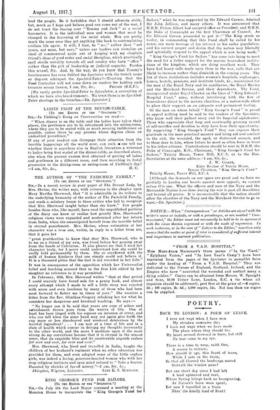THE AUTHOR OF "THE FAIRCHILD FAMILY."
(To ran EDITOR or THO SPIGTATOS."1
Sie,—In a recent review in your paper of The Devout Lady, by Mrs. Skrine, the writer says, with reference to the chapter upon Mary Martha Sherwood, that "it is admirable in its tribute to the underlying humanity of the author of The Fairchild Family, and reads a salutary lesson to those critics who fail to recognize that Mrs. Sherwood taught better than she knew." Few people Insides those who, like myself, have read the unpublished portions of the diary can know or realize how greatly Mrs. Sherwood's religious views were expanded and modernized after her return from India, when she emancipated herself from the terrible belief in eternal punishment. Mrs. Skrine, whose estimation of her character was a true one, writes, in reply to a letter from me, that it gave her "great gratification to know that dear Mrs. Sherwood, who is to me as a friend of my own, was freed before her passing away from the bands of Calvinism. It also pleases use that I read Iler character truly, for I. never could understand hew she could be really held permanently by them. She so overflowed with the milk of human kindness that one simply could not believe it. It is a thousand pities that the fact is not recorded in her Life." It was in consequence of the opposition which her Universalist belief and teaching aroused that in the first Life edited by her daughter no reference to it was permitted.
In February, 1836, Mrs. Sherwood writes "that at that period I could scarcely hare found sale for a penny book, and almost every attempt which I made to sell a little story was rejected with scorn and even insolence by many of those who had been most forward to flatter me in times of yore." She receives a letter from the Rev. Olinthus Gregory rebuking her for what lie considers her dangerous and heretical teaching. Ile says "No longer can it be said that yours are cups of solace and refreshment drawn pure from the waters of life. One at least has been tinged with too copious an infusion of error, and alto can tell when the same hand may not again give forth the cup more or less discoloured and rendered deleterious by the hurtful ingredient? ... I am now at a time of life and in a state of health which concur in driving my thoughts incessantly to the other world, and the more I meditate upon it the more strong do my convictions become that it is eternal in the utmost sense, that its exquisite bliss and its unutterable anguish endure for ever and ever, Jar ever and ever."
Mrs. Sherwood, who lived and travelled in India, taught the children of her husband's regiment when no other education was provided for them, and even adopted some of the little orphan girls, was indeed a loving, generous-hearted woman who with her deep religious instincts and open mind refused to " Take a heaven Haunted by shrieks of far-off misery."—I am, Sir, &c..


























 Previous page
Previous page